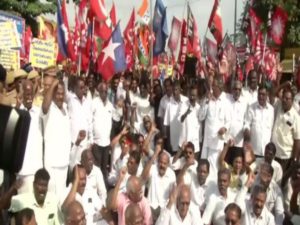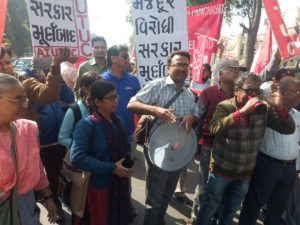CHENNAI/AHMEDABAD/NEW DELHI, JAN 8
Protesters on Wednesday hit the road across the country as trade unions called for a day-long strike as part of a Bharat bandh call. There was a mixed response for the nation-wide strike call given by the opposition backed central trade unions protesting against the anti-labour attitude of the union government on Wednesday.
Ten Central Trade Unions (CTUs) — INTUC, AITUC, HMS, CITU, AIUTUC, TUCC, SEWA, AICCTU, LPF, UTUC — along with various sectoral independent federations and associations protested against the “anti-people” policies of the BJP-led NDA government at the Centre.
Multiple banking activities such as cash withdrawal and deposits have been affected at branches of various PSU banks. Most public sector banks had earlier informed their customers about the call for strike given by All India Bank Employees Association (AIBEA), All India Bank Officers’ Association (AIBOA), BEFI, INBEF, INBOC and the Bank Karmachari Sena Mahasangh (BKSM).
Strike call gets mixed response in Tamil Nadu

There was a mixed response Tamil Nadu for the nation-wide strike call given by the opposition backed central trade unions protesting against the anti-labour attitude of the union government on Wednesday.
City and town buses have been operating partially, autos affiliated to left parties off the roads and normal life was not affected.
However, banking operations in the public sector banks were impacted across the state.
However, the number of buses plying on the roads was relatively lower compared to the normal days.
TNSTC buses bound for Kerala were stopped at the borders in Kannyakumari, and Tirunelveli districts, KSRTC buses were completely off the roads.
Members of various trade unions held protests on Anna Salai in Chennai and elsewhere in the state.
Over 10,000 police personnel have been deployed at railway/bus stations and other public places in Chennai.
Workers in private sector belonging to the striking unions showed their protest without affecting the production schedule.
In a statement issued here the General Secretary of All India Bank Employees” Association (AIBEA) C.H. Venkatachalam said banking transactions were greatly affected across the country.
He said in many places automatic teller machines (ATM) did not function and cash could not be deposited in bank branches.
“Cheques could not be sent to the Clearing House. In the Clearing Grids across the country, about 28 lakh cheques worth about Rs 21,500 crores could not be cleared due to the strike. Employees joined the strike with enthusiasm and expressing their anger against the government”s policies,” he said.
Similarly, work was affected in the four public sector general insurance companies where employees participated in the strike.
In a statement K. Govindan, General Secretary, General Insurance Employees All India Association (GIEAIA) urged the Central government to resolve the labour issues and drop the move of amending the Labour Laws in favour of the corporate sector. The association is participating in the strike alongwith members of two other unions — All India Insurance Employees” Association (AIIEA) and Bharathiya Vima Karmachari Sena (BVKS).
Normal life comes to a halt in Puducherry
Normal life was fully disrupted in Puducherry union territory on Wednesday as shops and educational institutions remained closed in response to the nation-wide strike call given by the opposition trade unions.
Trade unions of major political parties, barring the BJP, had decided to observe a bandh instead of holding a general strike, observed across the country in response to a call given by the national leadership.
However, no untoward incident was reported from anywhere in the region.
Most shops, business establishments and markets were shut. Public transport was largely off the roads. Supporters of the bandh held protest rallies at 11 places.
Former Minister R. Viswanathan, CPI (M) local unit secretary R. Rajangam, CPI (M) State committee member T. Murugan and AITUC general secretary K Sethu Selvam were among those who courted arrest while staging a protest at Raja Theatre junction.
Normal life affected in Kerala
Normal life has been hit in Kerala following the 24-hour nationwide strike called by various trade unions against the “anti- people” policies of the BJP led government at the Centre on Wednesday.
Shops and commercial establishments remained shut despite the Kerala Vyapari Vyvavasi Ekopana Samiti dissociating with the general strike. The busy commercial streets at Palayam and Big Bazar in the Kozhikode wore a deserted look. Similarly no shops have opened on Sweet Meat (S.M) Street and Moideen Palli Road.
Except for private vehicles and mostly motorbikes, public transportation has been affected in the city as well as mofussil towns. However train services have not been disrupted.
Educational institutions have been given a holiday and Calicut University has postponed all examinations scheduled for the day.
Normal life not affected in Karnataka
The nationwide strike had no effect on normal life in Bengaluru and other parts of Karnataka, with most of the vehicles, including government buses, plying on Wednesday.
While government buses, including the Karnataka State Road Transport Corporation (KSRTC) were plying as usual, train services remained unaffected.
Schools, colleges and business establishments also functioned.
However, there was some impact of the strike at the Agriculture Produce Marketing Committee yards where the labourers did not turn up.
In Mangaluru, inter-state services of Kerala State Road Transport Corporation were suspended.
Some miscreants pelted at a Karnataka State Road Transport Corporation bus with stones in Madikeri town in Kodagu district this morning.
According to an AITUC office-bearer Vijay Bhaskar, a rally was taken out from the Town Hall to the Freedom Park in Bengaluru. There were protests, demonstrations and march in different parts of the State.
Banking services partially hit in Gujarat

Banking services were partially hit in Gujarat on Wednesday due to the nationwide strike called by 10 central trade unions to protest against the Central government’s “anti-labour” policies. Transport services are absolutely normal across the state while offices of various business establishments also remained open. Although trade unions claimed that factory production was hit in many parts of Gujarat, industrialists said it was business as usual.
Video Courtesy: Sandesh TV
“Banking services in Gujarat were partially hit as employees associated with All India Bank Officers’ Association (AIBOA) joined the strike,” said Dhiraj Desai, general secretary of Bank of Baroda Employees Union.
Mixed response in Rajasthan
The nationwide strike evoked a mixed response in Rajasthan during morning hours on Wednesday.
Banking and roadways services were partially affected as members of trade unions joined the strike.
A demonstration was held in front of the LIC Building in Jaipur.
Members of the banking sector and LIC participated in the demonstration, Mahesh Mishra, a representative of bank employees union, said.
Rajasthan roadways employees affiliated with CITU also participated in the ‘Bharat bandh’
“Of the total employees, there are nearly 3,000 employees affiliated with CITU in roadways who are participating in the Bharat bandh. The strike’s impact is on buses’ operations in Churu, Ganganagar, Sikar,” Kishan Singh Rathore, general secretary of Rajasthan roadways workers’ union (CITU), claimed.
However in Jaipur, most of the markets opened as usual and there was not much impact on public transport services.
Normal life disrupted in Odhisha
Normal life was disrupted across Odisha due to the country-wide general strike.
Train and bus services were hit in several parts of the State with trade union activists, backed by supporters of the Left parties and the Congress, blocking railway tracks and roads in support of the 24-hour strike.
Shops and business establishments remained shut in most parts of the State. Educational institutes were also closed in many districts.
Banking operations were hit, while the strikers kept emergency services such as hospitals and ambulances out of the purview. The State government had issued prior directive for its employees to reach their respective offices early.
Elaborate security arrangements were made at many places, including State capital Bhubaneswar to prevent any untoward incident during the strike.
Bhubaneswar Deputy Commissioner of Police (DCP) Anup Sahoo said 15 platoons (each platoon has 33 personnel) have been deployed to maintain law and order during the strike.
The strike has been peaceful so far with no untoward incident reported from any part of the state, a senior police officer said.
A large number of passengers were stranded at several places as more than 15 trains were stuck due to blockades at Talcher, Bhubaneswar, Bhadrak, Keonjhargarh, Brahmapur, Puri and Cuttack, a railway official said.
Many passengers were also stranded at bus stands in Bhubaneswar, Cuttack, Puri, Berhampur, Sambalpur, Rourkela, Balssore, Bhadrak, Khurda and Jagatsinghpur, among others, police said.
As a precautionary measure, schools were closed in Kandhamal, Ganjam, Dhenkanal, Khurda, Bhadrak, Gajapati, Jagatsinghpur, Rayagada, Jharsuguda, Nayagarh, Boudh, Jajpur, Malkargiri, Kendrapara and Kalahandi districts, sources said.
Describing the strike as a complete success, state Congress chief Niranjan Patnaik said people have extended support to the agitation spontaneously as they are fed up with the “anti-labour and anti-farmer” policies of the BJP-led government at the Centre.
Strike hits road, rail traffic in parts of Bengal
Road and rail blockades were reported from several parts of West Bengal on Wednesday as trade union activists along with Left and Congress supporters picketed in support of the 24-hour general strike against the Centre’s “anti-people” policies.
The strikers took out rallies in parts of the State and blocked roads and railway tracks in North 24 Parganas district. But police removed them to ensure movement of vehicles without hitch.
In Kolkata, government buses were plying normally but the number of private buses was less in the early hours. Metro services were normal in the city and auto-rickshaws and taxis were also seen on the roads.
Heavy police deployment was seen in several areas of the city, including in Tollygunge, Behala, Esplanade and Jadavpur.
In some areas of north Bengal, the Trinamool Congress took out rallies opposing the strike and urged people to maintain normalcy.












